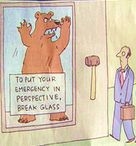AHI15 wrote:
I estimate that I sleep 7-8 of the allotted 9-9.5hrs.
So your sleep efficiency ranges from a low of 7/9.5 = .737 (73.7%) to a high of 8/9 = .889 (88.9%). My guess is that you probably feel and function better on a day when you get 8 hours of sleep in a 9 hour TIB than you do when you get 7 hours of sleep in a 9.5 hour TIB. And if we guess that a typical night is probably close to 7.5 hours of sleep in a 9.25 hour TIB, that would mean your typical sleep efficiency is about .811 (81.1%)
My wild guess is that you might feel better in the long run if you tried limiting TIB to something like 8-8.5 hours.
I have ADHD and ADHD people have an average sleep latency of 45 minutes. This is a fact. This complicates sleep hygiene rules which say don't lie for more than 20 minutes. Well, what do we tell ADHD people then?
You adapt the rules: If average latency in the ADHD population is 45 minutes, you replace every "don't lie for more than 20 minutes" in the sleep hygiene rules with "don't lie for more than 40 minutes." And you stress the second part of that "20 minute rule" which is: "You don't lie in bed if you are becoming more awake and less sleepy when you are trying to get to sleep." In other words, given the circumstances, the working good sleep hygiene rule becomes something like this:
Don't lie in bed for more than about 40 minutes if you can't get to sleep. Also don't lie in bed if you start to become more awake and less sleepy when you are fighting to get to sleep.
Also, since I wake up at least 2-4 times a night even with the CPAP, and even with a sleeping pill, I have to face the possibility of an ADHD-style sleep latency multiple times a night. So it is very hard to get high sleep efficiency. I might get 70-80% most of the time, with occasional bouts of 85-90%.
If you can sometimes get to 85-90%, then you can learn to get to 85-90% as your average sleep efficiency in the long run.
One part of getting there is, of course, not waking up as often. But another significant part of CBT-I is teaching your body to NOT respond to a small wake by turning it into a big wake. In the non-ADHD and non-insomniac population, average latency to sleep at the beginning of the night is around 20 minutes, but average time to get back to sleep after a middle-of-the-night wake is
less than 5 minutes. So since the average ADHD latency to sleep at the beginning of the night is a bit more than twice as long as the average non-ADHD latency to sleep at the beginning of the night, it seems reasonable to assume that a ADHD person without insomnia is likely to get back to sleep in 5-10 minutes after a middle of the night wake. In other words, once you start the CBT-I, you will need some help on figuring out what kinds of things you are doing when you wake up that are turning the expected 5-10 minute wake period into a longer, more significant wake period and what kinds of things you can do to encourage your body to NOT become fully alert and wide awake every time you happen to wake up for no particular reason.
Although, due to not working much these days and thus having less technically complex stuff whirling in my head, I am tending to fall asleep maybe in 20-30 minutes. It is very difficult to be sure of this without EEG, as you certainly must know, we can have drastic mis-perceptions about our sleep time.
Yes, most insomniacs have drastic misperceptions about their sleep: As a group, insomniacs tend to significantly
under estimate their total sleep time and
over estimate the amount of time they are actually awake while in bed. People without insomnia tend to have pretty accurate estimates of their total sleep time and the amount of time they are awake in bed----even on a "bad" night where they are having some trouble getting or staying asleep for some reason.
There have been some studies (with EEGs) that show part of the problem is that insomniacs seem to have a tough time distinguishing between WAKE and Stage 1 and Stage 2 sleep. One study that I've read had the experimenters waking the subjects at random times during the night and asking them "Were you awake before I came in to wake you up?" Insomniacs woken in Stage 1 and Stage 2 sleep often (as in 40-50% of the time) said they were already awake---even though the EEG indicated they were in Stage 1 or Stage 2 sleep. Non insomniacs seldom said the were awake if the EEG indicated they were asleep.
There's also some evidence that insomniacs and non-insomniacs think (and talk) about their sleep in different ways: Insomniacs use negative descriptions of their sleep---they think about
how little sleep they got and
how much they tossed and turned during the night. Non-insomniacs use positive descriptions---they talk about
how much sleep they got and they don't typically think about the time they were awake at all. Insomniacs also judge the quality of their sleep by comparing it to an idealized standard ("I want to get 8 hours of uninterrupted sleep every single night"), but non-insomnics typically judge the quality only on how they feel when they wake up. If they only got 6 hours and woke up once and then decided to go to the bathroom, but they feel fine in the morning, they don't worry about getting "only 6 hours" of sleep and they don't worry about why they woke up.
And so many CBT-I programs contain a patient education component to teach the insomniac how to set reasonable expectations on what a decent night's sleep looks like in terms of total sleep time and number of wakes. And how their misperceptions about their sleep may be contributing to their problem. And how it is likely that their sleep quality is better (and perhaps far better) than they think it is. And how to use this information to get better, more accurate estimates of the real quality of their sleep.
On Lunesta or another Z-drug sleep aid, I think I have been falling asleep faster, maybe in 15-30 minutes. I seem to drift into a light sleep a few times for just seconds, then wake up and I have to wait again. I keep trying to fall asleep on my back first since it's more uncomfortable and time consuming to fuss with the mask on my side. Though, before CPAP I could ever sleep on my right side no matter what I do.
This again is a behavior pattern that the CBT-I may help you deal with. You are likely falling all the way to Stage 2 sleep at times, and then drifting between Stage 1 and Stage 2 sleep, but your brain winds up perceiving some (perhaps all) of the Stage 1 sleep as WAKE. In other words, it is possible that the period you are remembering as "waiting to fall asleep again" is a mixture of Stage 1, Stage 2, and WAKE.
As far as sleep position: It is well worth the time and effort to figure out how to get as close as possible to your pre-CPAP preferred position for falling asleep. Eventually, getting into position becomes easier---once you solve the problem intellectually. For me: Pre-PAP, I would fall asleep on my side with my nose nestled into my hubby's underarm. There's really no way to do that with a hose. But after about a month or so, I figured out that with the hose I could sleep all night with my head under the covers (another pre-PAP favorite position that was "time limited" by the need to come up for air). And once I started sleeping with my head under the covers, I soon found a good spot on hubby's back and hip that I could snuggle into without bugging him and that gives me the old security I used to get from snuggling into his underarms.














